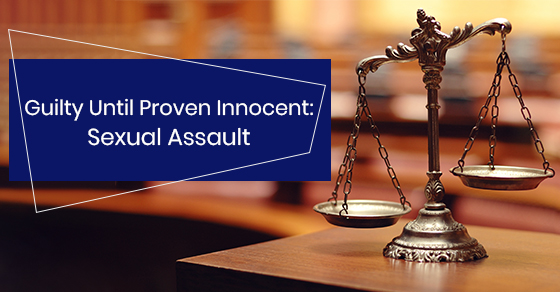GUILTY UNTIL PROVEN INNOCENT: SEXUAL ASSAULT

If you are facing a sexual assault charge, take note: the government has made it easier to find you guilty. In this blog, we describe five ways in which the government has done so.
As part of its agenda to “believe survivors” or to “believe victims”, the federal government has listened to activists who wish to see more men convicted of sexual assault. Despite the fundamental right to the presumption of innocence, the government has enacted new laws, and the Supreme Court of Canada has interpreted sexual assault laws, to make it more difficult to defend against a sexual assault allegation.
The result will be that more men will be convicted of sexual assault. There will also be more wrongful convictions.
Why Is The Government Doing This?
Some of the stated reasons for these laws, and the ways that the courts are interpreting them, are well-intentioned: to make it less stressful for complainants; to reduce court delays; to try to eliminate myths and stereotypes about sexual assault from decision-making. But one of the reasons that is less often stated is that the government wants more men to be convicted of sexual assault, and these laws and interpretations will make it easier.
There are three key moments in our recent history that have galvanised the government into passing these laws. The first is the acquittal of former CBC host Jian Ghomeshi. Activists decried his acquittal because they felt that he should have been convicted, even though the complainants colluded with each other and lied under oath in court. The second was an investigation by The Globe and Mail newspaper showing that the police historically had chosen not to lay charges in many instances where sexual assault had been alleged. The third was that we have a prime minister who proclaims himself a feminist, and these laws are in part designed to address some of their concerns.
What Are These Changes?
There are several changes to the law that have made it more difficult to defend against sexual assault allegations. Here are five ways that the government has made it harder to defend against a sexual assault allegation:
-
Preliminary hearings have been eliminated in sexual assault cases. The preliminary hearing provided an opportunity to question the complainant about the allegations and to find out more about the case. This not only gave the defence an opportunity to develop a strategy for the trial and to understand the case better, but also to expose weak cases. Preliminary hearings were the most effective tool available to the defence to challenge sexual assault allegations. The government chose to eliminate them in part to prevent the complainant from having to testify twice (at the preliminary hearing and at the trial); and ostensibly to reduce delay in the court system by reducing the number of hearings. However, preliminary hearings do not take up a lot of court time: there are already laws in place to narrow the issues and judicial discretion to prevent abuse or misuse of court time. The reality is that the government has chosen to erode a fundamental Charter right (the presumption of innocence) by taking away an important procedural protection against wrongful conviction. They have chosen to do so to reduce the discomfort experienced by the complainant, even though there have already been several initiatives designed to do so, from privacy screens to support persons and even comfort dogs in court.
-
The defence is now required to reveal its evidence. Because the credibility of the witnesses in the Ghomeshi case was challenged using their own text messages, the new laws require that the defence reveal to the Crown and to the complainant any messages, photographs or other communications they wish to rely on. The complainant is now given special status to challenge the use of those messages, and the opportunity to prepare a reply to them before being confronted in court. In addition, the defence is now required to seek permission to even introduce those messages in court.
-
The ability of the defence to explain the context of the relationship has been further limited. In a series of recent cases, the Supreme Court has made it more difficult for the defence to explain to a jury or trial judge the true nature of the relationship between the parties. For example, if the complainant and defendant engaged from time to time in casual sex (“friends with benefits”), the jury will not be allowed to hear that. The interpretation of the law will often require that they be given an artificial version of the truth in order to protect the complainant from stereotypes about sex, such as the assumption that just because a woman has consented to sex before, she is more likely to have consented again. In cases other than sexual assault, the judge would simply provide an instruction to the jury as to the permissible and impermissible uses of that evidence. That is the way that prosecutors are permitted to introduce evidence damaging to the defendant. But when it comes to sexual assault, these laws and their interpretation suggest that the jury cannot be trusted to follow such instructions.
-
The ability of the defence to have a say in jury selection has been eliminated. For centuries, the right to be tried by a “jury of your peers” has included the right to challenge a number of them. This permitted a defendant to have a say in selecting a jury that was balanced by way of gender, occupation, age, ethnicity, etc. so that the defendant could feel more secure in placing his or her fate in the hands of these otherwise randomly chosen people. That right has now been eliminated, and the defendant is required to be judged by the first twelve people to come forward, regardless of how uneven or lopsided that jury is in terms of its composition. By taking away that participation by the defendant, the government has made the process more hostile and more unfair to the defendant, and made it appear that the odds are more stacked than ever against him.
-
The ability of police and prosecutors to exercise their discretion has been severely reduced. Activists have been clamouring for police to lay more charges of sexual assault, and the government has been pressing police and prosecutors to pursue more cases more aggressively. That has resulted in the police throwing up their hands and choosing to no longer use their experience and their investigative skills to determine which cases to pursue. Instead, in more and more instances they take the statement from the complainant and go out to make an arrest. Rather than acting as a filter for weak or unfounded cases, they are simply “passing the buck” by sending all these cases to court. Prosecutors have also had their discretion (to decide which cases to fight and which cases to resolve) eliminated by policy changes that require them to prosecute every case. Only a deputy director can authorize the withdrawal of a sexual assault case, and that discretion is rarely exercised.
The reality is that the views and attitudes of the public and of the justice system participants has evolved in recent decades towards a better understanding of the reality faced by victims of sexual assault. Laws and policies and education requirements were changed to put that enhanced understanding into practice. But what has happened recently, with laws that were passed reflexively to meet political ends, or in an attempt to address a complex problem like court delay with a simplistic solution, is that the pendulum has swung too far. By seeking to accommodate all interests, the justice system in sexual assault cases is losing sight of the fact that a trial is about the guilt or innocence of the accused, not a restorative justice exercise among diverse stakeholders. And in eroding the presumption of innocence, the government is placing political expediency ahead of fundamental rights. And in the long run, I predict that it will not only result in the destruction of more innocent lives; it will contribute to the erosion of the public’s confidence in the administration of justice.
If you are facing criminal charges related to sexual assault, now more than ever, you need an experienced and skilled lawyer to defend you. Call The Defence Group for a free consultation at 877-295-2830. Arun S. Maini is a criminal lawyer and former prosecutor with over 20 years of experience.


